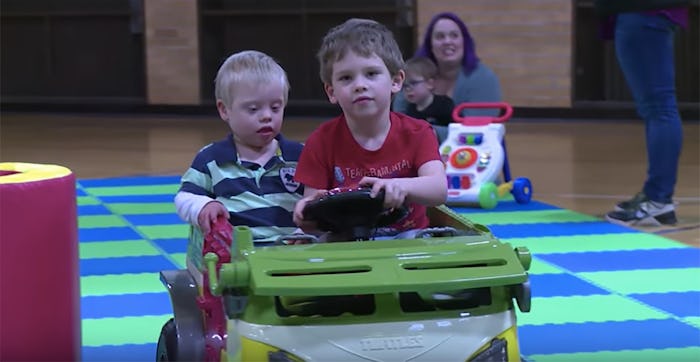News
There Are Electric Toy Cars For Disabled Babies, & They Are So Impressive
It's no secret that the consumer market struggles to accommodate children with disabilities and their families. From a lack of adaptive toys to insufficient representation, there's a lot of work to be done to make kids with disabilities feel seen and respected. Fortunately, however, there are some organizations out there that are actively working to fix these aforementioned issues. And one particularly awesome organization, Go Baby Go, is designing electric toy cars for disabled babies. The best part? Go Baby Go is enlisting the help of female engineers to design the cars. Yep, the whole thing is as amazing as it sounds.
Boise State University, a public university in Idaho, has enlisted its Society of Women Engineers to help build cars (free of charge) for disabled children across the state. The student engineers are partnering up with Go Baby Go, a "national, community-based research, design and outreach program that provides modified ride-on cars to children birth to age 3 who experience limited mobility," according to Oregon State. Additionally, St. Luke's Boise Medical Center will help find families to participate in the project and Home Depot will chip in for building costs, according to KTVB, a local station in Idaho.
As for how the program works, the student engineers meet with families on prospective "Build Days," which give both parties the chance to work on the cars together. It's important that families and the engineers meet, because each car is designed to accommodate each child's unique needs. For instance, if a child can't access a foot pedal, an engineer would replace the pedal with a large button at the front of the car's steering wheel. Of course, that's just one of the many examples of how an electric car could be modified.
But why do the students focus on electric cars? Although it might seem random to some people, the emphasis on electric cars makes a lot of sense. "Go Baby Go is a foundation that helps disabled kids get around and start moving around, when otherwise they would be in a wheelchair or being held," student Catherine Walker explained to KTVB.
As Walker mentioned, what is especially neat and important about this program is the emphasis on accessing mobility. And Go Baby Go's founder, Cole Galloway, summed up the idea of mobility perfectly in a 2014 TEDMED talk. “Human mobility is a human right,” Galloway said, according to Mobility Management. “Active, independent mobility literally changes our view of the world.”
Additionally, the electric vehicles can play a big role in a disabled child's socialization. Think about it: if a child is physically disabled, there's a good chance they won't have as many opportunities to participate in common forms of play with other kids (running around at the playground, etc.). But if a disabled child has an electric toy car to freely move around in, it's possible for them to enjoy a wider range of activities alongside their peers. Considering isolation can be a big problem for children with disabilities, it's really cool that these cars aim to help kids join in on mobile activities.
Not to mention, it's incredibly touching that students are getting involved in the building process — a sentiment Galloway emphasized in a statement to Romper. "The Boise State build is a powerful example of young people who aren’t waiting to have impact," Galloway told Romper in a Facebook message. "Their efforts are at the heart of the modern university mission: to solve community problems as defined by communities. Thorough social media the Boise State chapter of Go Baby Go mentors the world."
Unsurprisingly, many parents are loving the project. Jessica Mandujano, a mom who participated in a Build Day, said, according to KTVB:
I was just floored. I had no idea that something like that even existed. It kind of just really opened something up to him that he didn't have access to before. It means the world to us, to see our kid be able to do things other kids can do.
And on that note, if you're interested in procuring a car for your child, contact your local university to find out if they participate in Build Day. If not, Go Baby Go's website offers a ton of helpful information about buying and modifying your own car. To top it all off, the organization's website also provides materials to launch your own Build Day locally.
As for the project's future, this is a grassroots effort that will hopefully continue to gain momentum across the United States. It goes without saying that kids deserve access to mobility, and it's incredibly cool that people are starting to pay attention to these needs.
Check out Romper's new video series, Bearing The Motherload, where disagreeing parents from different sides of an issue sit down with a mediator and talk about how to support (and not judge) each other’s parenting perspectives. New episodes air Mondays on Facebook.
